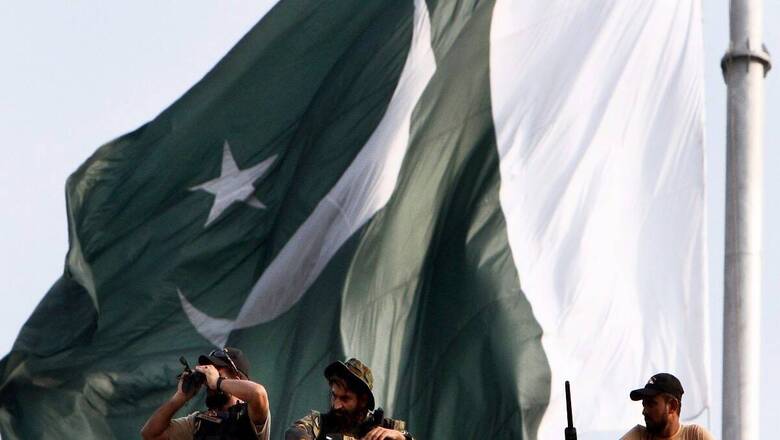
views
India, Afghanistan, Iran, BLA: Pakistan Has Made More Enemies Than It Can Afford
A pompous Zulfikar Ali Bhutto had declared war on India in 1965. This was not any ordinary declaration of war. It was a declaration made from the stage of the United Nations Security Council. Bhutto said Pakistan was going to wage a “thousand-year war against India”. The strategy the Islamic Republic settled on was that of “bleeding India with a thousand cuts”. What Pakistan perhaps failed to recognise was the fact that it was declaring a proxy war against a civilisation that has given the world the concept of “karma”. Today, as karma would have it, Pakistan is the country bleeding with a thousand painful cuts as life comes full circle for the terror hub of the world.
Have a look at what is happening across Pakistan. Armed militants and insurgents are essentially on a free run. Whether it be the rebels of Balochistan fighting against occupation or the insurgents in Khyber Pakhtunkhwa – they are all making life extremely difficult for Pakistan. There is also the Islamic State Khorasan Province (ISKP) and Tehreek-e-Jihad Pakistan – both of whom have an axe to grind with Pakistan. Add to that, the Afghan Taliban, which Pakistan nurtured for years, has turned against it. Incidents of fire exchange between Pakistan and Afghanistan are not difficult to come by now, especially since Islamabad is stepping up attacks inside Afghan territory to supposedly fight terrorists. Gone are the days when Pakistan and its intelligence service were credited with having more influence over the Afghan Taliban than any other country or intelligence organisation of the world.
Today, the Afghan Taliban has no compunctions about backing the Tehreek-e-Taliban Pakistan (TTP). Then there is Iran, which recently struck Pakistani territory over what it believed to be a safe haven for insurgents belonging to Jaish al-Adl. Pakistan responded with air strikes on several targets in Iran’s Sistan-Baluchistan province with the aim of targeting alleged sanctuaries of the Balochistan Liberation Army and Balochistan Liberation Front. Islamabad also recalled its ambassador from Tehran and prohibited the return of the Iranian ambassador to Pakistan. Although ties have been normalised since, the dramatic flare-up went on to show how Pakistan is surrounded by countries and regimes that have grown a strong sense of dislike for it.
Add to that, anti-India terrorists in Pakistan have reportedly been dying in mysterious circumstances, with alleged “unknown men” having a connection to many of these “killings”.
Meanwhile, guess who is taking the hit for its proximity to Pakistan? Islamabad’s “all-weather friend” – China. Chinese nationals have become prime targets for rebel and militant groups in Pakistan. The Balochistan Liberation Army (BLA) alone has claimed responsibility for two assaults in Balochistan. One targeted the Turbat naval air base, which apparently hosts Chinese drones, while the other attack was directed at the Port Authority Complex of the Gwadar port, a facility operated and developed by the Chinese. The most dramatic attack came in late March when five Chinese engineers engaged in constructing the Dasu Hydropower Project along the Indus River as part of the China-Pakistan Economic Corridor (CPEC) were killed in a suicide attack.
China obviously does not like the way its engineers and workers are being forced to constantly watch over their shoulders, which is why Beijing is understood to have sternly told Islamabad to implement “effective measures to protect the safety and security of Chinese nationals, institutions, and projects.”
For Pakistan, the threat from terrorism appears to be becoming too big to handle. Figures show that militant attacks across the country killed more than 1,000 people in 2023 alone. Among these, civilian deaths numbered around 500, while an equal number of armed forces personnel bore the brunt as well. These are mind-boggling numbers. For any country not in a state of active war to lose 500 security personnel and an equal number of civilians in just one year is unheard of. 2023, as it turns out, was the deadliest year for Pakistan in a decade. The number of terror casualties Pakistan has suffered between the years 2000 and 2019 is even more staggering. More than 63,000 people have been killed in attacks during this period.
Today, Pakistan’s air and naval bases are also coming under regular attacks. If these developments are anything to go by, 2024 could be far worse for Islamabad than 2023 was.
What Does the Future Look Like for Pakistan?
Remember, Pakistan is not India. Pakistan does not have what it takes to survive a sustained campaign in which it bleeds with a thousand cuts. For starters, the sheer number of groups and organisations vying for Pakistan’s blood is unprecedented. Couple that with the intense economic crisis and political fragility which Pakistan finds itself combatting, and the question quickly turns to how long Pakistan can survive as a nation. For Pakistan, the threat of balkanisation has not been this great in a very long time. This is a country being torn at the seams. Balochistan wants freedom, TTP is exerting greater influence and control in Khyber Pakhtunkhwa, while Pakistan-occupied Kashmir is erupting in protests.
Faced with a litany of threats, Pakistan wants trade ties to be restored with India. They have been fiddling with the idea, and Pakistan’s foreign minister Ishaq Dar recently said that the trade suspension with India will be reviewed. This was probably an experiment to test the waters with India. New Delhi, however, is not inclined to either engage diplomatically with Pakistan or indulge in normal trade with it.
Read More: Straight Talk | Cash-Strapped Pakistan Turns to India for Help Amid Economic Crisis
As mentioned earlier, Pakistan has, as a matter of national policy, used proxy warfare and terrorism to hurt India over a “thousand-year” period. However, from what can be seen happening in Pakistan, it becomes largely evident that the country may not survive the century, let alone be around for the next thousand years to wage war on India.
While terrorism is proving to be a bloodier challenge for Pakistan, its economic miseries appear to be setting the stage for a disgruntled population to go rogue soon. In Pakistan’s financial year that ended in June 2023, more than 12 million people fell into poverty, according to the World Bank. Pakistan is a nation struggling to survive under a mountain of debt. Inflation has neared a whopping 33 per cent in recent estimates. The Islamic Republic has $8 billion in foreign currency reserves, while it is required to cobble up $22 billion for debt payments and maintain its current account deficit for the ongoing fiscal year. This has led to Pakistan seeking its 24th bailout from the International Monetary Fund, further amplifying the message that the country now survives entirely on international bailouts.
The Pakistani military’s recent dismantlement of any semblance of free, fair and tamper-proof elections appears to be compounding the country’s challenges. While the people of Pakistan wanted Imran Khan to return as the prime minister, the military establishment robbed them of this right with their skilful rigging of elections which resulted in Shehbaz Sharif becoming prime minister again.
All of this reinforces the notion that Pakistan is simply not equipped to survive as a nation-state for long. There is widespread public anger against the political and military establishment, an economic crisis that is plunging millions into poverty and an uptick in insurgencies that is claiming the lives of ordinary citizens regularly. On top of it all, Pakistan is seen as a global pariah – courtesy of New Delhi’s diplomatic mission to ensure that the country faces the heat for using its terror industry against India.
For Pakistan, the threat of an implosion has never been greater. As the country faces an uncertain future and fades out of the world’s mind space, it is Pakistan’s homegrown network of terrorism that has come back to haunt it. After all, proxy warfare is never a one-way street. Pakistan is learning this the hard way.
Views expressed in the above piece are personal and solely those of the author. They do not necessarily reflect News18’s views.





















Comments
0 comment